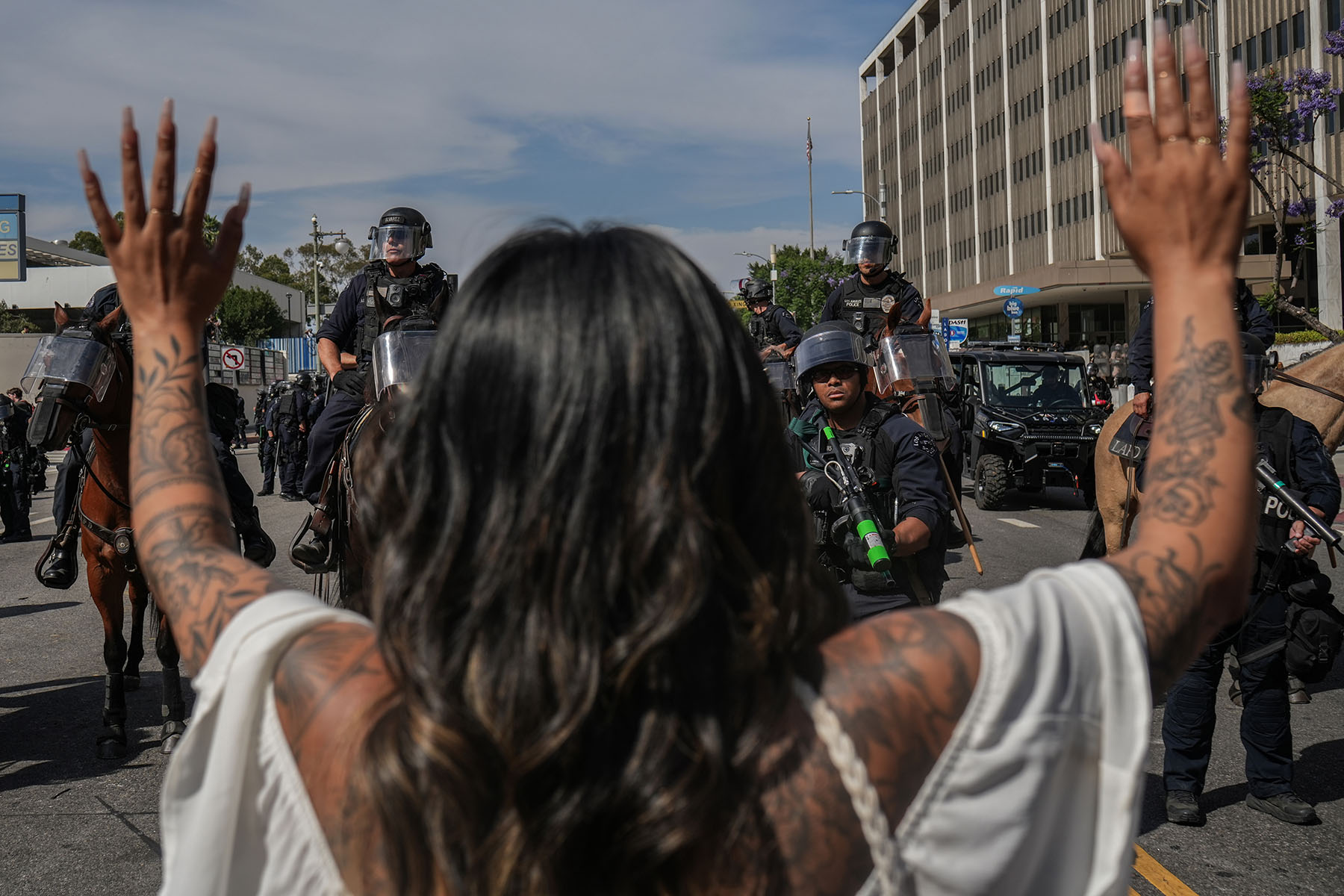“Too much, too soon, too fast” — psychologists warn that this is a recipe for trauma. And over the past six months, no city nationwide has been battered in such a way like Los Angeles.
The year began, as Joan Didion once wrote, with “the city on fire, just as we had always known it would be.” Before Angelenos could recover from the hurricane-strength winds that blanketed L.A. in flames, killing more than two dozen people and destroying some 15,000 structures, new fears surfaced — whispers of Immigration and Customs Enforcement (ICE) stalking parking lots, circling schools and detaining immigrants across L.A. County.
First came the rumors: ICE is at the Target in Alhambra. They’re parked near a high school in South L.A. Then came the confirmations — federal agents on church grounds, mass raids at Home Depot locations, protests met with militarized force. The National Guard’s presence downtown, in a city already prone to what Didion called “apocalyptic notions,” made it feel like Los Angeles was under siege.
But for immigrant communities, the siege isn’t just a feeling — it’s reality. Families have grappled with disappearances, deportations and the constant fear of being hunted. When Sen. Alex Padilla — a Democrat and the son of Mexican immigrants, was tackled during a Department of Homeland Security briefing Thursday — they reflexively flinched.
Psychologist Lisette Sanchez understands this trauma intimately. Raised by working-class immigrants in Southern California, she’s spent this tumultuous year treating an increasingly anxious, bicultural clientele from her Long Beach practice. She helps first-generation Americans and others who’ve been told, both overtly and covertly, they don’t belong — and experience the exhaustion, silencing and self-doubt that accompanies such alienation.
The 19th spoke with Sanchez about pressing forward in an unforgiving year, healing intergenerational trauma and how immigrant communities can weather a reactionary political climate.

This interview has been edited for length and clarity.
Nadra Nittle: Given the recent immigration raids across Greater Los Angeles and the Trump administration’s militarized response to them, Southern California has been on edge. What are immigrant communities, in particular, experiencing right now?
Lisette Sanchez: The recent ICE activity in Los Angeles has left many in our immigrant communities feeling a renewed sense of fear, grief and hypervigilance. This impacts people beyond those directly targeted. These raids often reactivate intergenerational trauma for families who have experienced displacement or detention in the past.
In my work, I’m seeing how this is manifesting: People are struggling with sleep, experiencing heightened stress and adjusting their day-to-day routines out of fear. Some are avoiding spaces they used to feel safe in or choosing not to access services they’re entitled to. This kind of fear is profoundly disruptive, and it’s heartbreaking.
What can people, both in and outside immigrant communities, do to help?
There are many ways we can push back against the message that our pain should be hidden. Resilience is powerful, but we don’t have to be resilient alone. I encourage folks to seek support, share their stories when they feel ready, protest, call their representatives and have those tough conversations with loved ones.
For those who are not directly impacted but have the capacity, I encourage you to look for ways to support your community. I’ve heard from people who no longer feel safe shopping at their regular grocery stores or even being in predominantly Latinx neighborhoods, out of fear that those areas may be targeted. This is where collective care matters most.
School graduations are taking place right now, but the recent raids have sparked such fear that some immigrant families feel too vulnerable to celebrate this milestone in their children’s lives. Can you describe what young people might be going through emotionally at this time?
Oftentimes, children of immigrants, they’re already placed in a parentified role. Parentification refers to when that child is placed in the role of an adult that’s beyond their developmental level. There’s instrumental parentification — like interpreting for parents who don’t speak English. Instrumental parentification is usually the one that people look back on and say, “Oh, I learned all these skills that helped me.”
Then, there’s emotional parentification — you feel that you are responsible for the emotions of the adults in your life, like you need to take certain actions to make sure that they feel safe, that they feel secure, which is typically the role of a parent. Emotional parentification is what can cause long-term mental health consequences.
It’s just unfortunate because there are a lot of really big decisions that are being talked about with children, and they don’t have the full capacity to understand exactly what’s happening.
You say that, for undocumented immigrants, obtaining “papers” is about more than legal status, it’s about a sense of safety. Can you elaborate?
For example, my mom came to the United States from El Salvador. My mom is a citizen now, but she was not when she came. My mom was held in a detention center her first time attempting to cross. Her life was threatened in El Salvador. My grandfather had been murdered, and my grandmother was just trying to bring them to safety, and they brought them here to the United States, and my mom now finds that a sense of safety is hard to fully experience because of the psychological safety that was removed when she was a kid. Even people who are citizens, just based on our ethnic identity, are working to establish a sense of safety. I’ve been receiving messages from folks who are like, “This is the first time I’ve been afraid about the fact that I am Latina.” They are not even undocumented, just people with a marginalized identity. I’ve noticed increased fear there.
Yes, I’ve also heard about U.S. citizens feeling like they need to carry around a passport or a birth certificate in case they get stopped. In some cases, U.S. citizens have been detained, so there is this fear that citizenship is not protective. Do you agree?
There is a strong fear that being a citizen may not protect you. Mental health wise, that leads to chronic anxiety. That can impact you in so many different ways. It’s not just the racing thoughts and increased heart rate. It also can impact an individual’s sleep, and that can lead to other chronic health issues. In times of uncertainty, we can try to manage by taking control of what we feel we do have control over.
What toll do you think this political climate is having on people in mixed-status households, in which some family members are citizens and others aren’t?
There’s different kinds of fears that each member of the family would have. The family members who are citizens might say, “I was born here, but I still fear for my community.” In terms of the mental health impacts, I think it’s impacting the community as a whole. You might just see people being a bit more on edge. They might also be more protective. The family members born here might feel additional pressure as the one with the citizenship privilege. They might say, “Oh, I’ll go get the groceries. I’ll go do this.” They might feel a stronger sense of responsibility towards taking things on. But I think that the mental health impacts are still pretty strong for each member of a mixed-status family. I don’t know that one person is worse off than the other.
Polls in early June found that most Americans approve of President Donald Trump’s handling of immigration, though his approval rating on the issue has fallen since the unrest in L.A. began. Does the fact that many people support mass deportations of all undocumented immigrants suggest a lack of empathy, and what can be done about it, if so?
When I’m working with anyone on an individual level, I let them know that you have to take care of your needs first before you can worry about someone else’s. I think the role of helping other people develop more empathy is placed on people with more capacity for that. So if you have any kind of privilege, enter spaces where typically people wouldn’t access stories about immigrants and bring those experiences up. I don’t think that it’s the role of the person whose current nervous system is incredibly activated to help others develop empathy for them. I think they have to focus on sort of navigating the emotional distress they’re experiencing or their immediate family or community is experiencing. The responsibility falls on others to be allies and advocates and to amplify immigrant stories.
You’ve mentioned intergenerational trauma among immigrant families. How does it get passed down?
There’s a bunch of different ways that it passes on to individuals, and one way is the behaviors that they see. So my mom has always been hypervigilant about our sense of safety. Since I was a little kid, I was given pepper spray to carry with me at all times, even when I would take the trash out. My mom needed to make sure that I understood how to get out of the trunk of a car. She never put me in one but would explain it to me. When we would travel and get an Airbnb somewhere, my mom would put chairs up to block the door. She’s done this ever since I was a kid. So, now, whenever I’m home by myself, I double block my door and I even have a door stopper. I have a hard time falling asleep if I don’t have the door stopper if I’m home alone. If someone else is with me, I’m more at ease. But that’s just one example of a behavior that got passed down in my family.
They’ve done research on how trauma impacts your genetics. They found, for example, that firstborn daughters inherit some of the stress that the mother is experiencing while they are pregnant and can make it so that the daughter hits puberty much more quickly.
As for my dad, we visit Mexico at least once a year, but every time we come back into the United States and go through customs, my parents, especially my dad, get very physically uncomfortable. He gets really nervous and flustered, and I’ve witnessed that ever since I was a kid. So, now, anytime I go through customs, I get anxious. I tell myself, “I’m good, I’m coming home. Why am I so stressed?” But then I remember witnessing my dad start to sweat, start to jumble up his words and start to get really tense.
What can parents do to avoid inadvertently passing on their trauma to children?
If a parent is reading this, they should consider having more open conversations with their kids around what is actually expected of them because the kids are inundated with information. They’re going to want to help their parents. So having clarity in those roles is really helpful. It removes the internal pressure that children may place on themselves.






